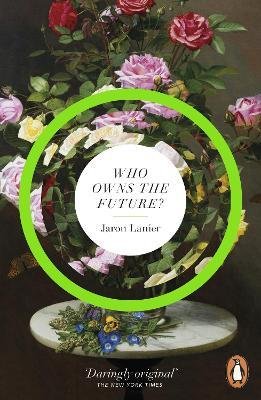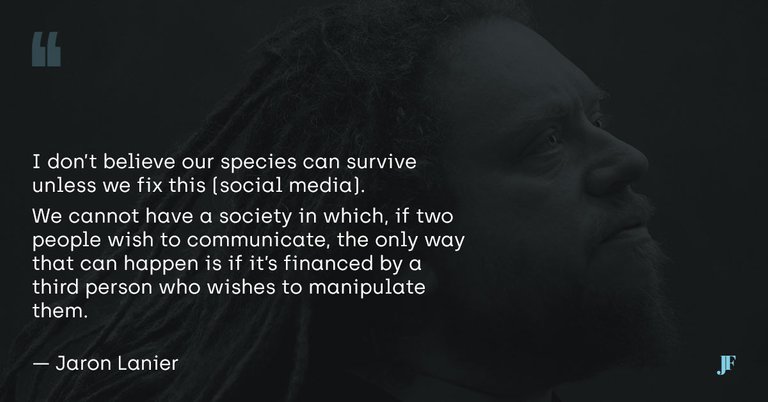The end of a digital feudalism
It was around 2016 when I read my first book ever in English. Some random guy on the street pitched it to me, while I was collecting signatures under petition against TTIP. He said something like: "Naah, this is a small issue, do you want to know what a real issue is? Read Who Owns The Future by Jaron Lanier"

I got intrigued, I've got to admit. It was around the time I took a course about alternative economic models, and after reading some opinions online I decided to order it. At this time it was mind-blowing for me! Author painted a vision of future where mega corporations will create Siren Servers, ultimate computational monster competing with each other and removing anybody else from the market with a sheer informational advantage.
The story lead do technocratic future, where power is more and more centralized in hands of a few. Traditional power centers are supposed to be not sufficient and impotent in the new, digital world. BTW, this is not that far from what we can observe. Our data is collected without any compensation and used to target us with precise ads, and build next models improving profits. Our precious accounts and following groups are meticulously monitored and censored whenever somebody will cross the line. Twitter papers didn't shock anybody, and this is just a tip of the iceberg.
Somewhere at the end are we, humans. User experience needs to be only sufficient to keep our attention, and software is optimized for bigger engagement. Our data is precious, and by staying longer in the system we deliver more of it. Teams of psychologists and linguists carefully tailor digital experience using faults of our psyche, creating habit-forming mechanisms.
From gaming to social media, from videos to news, it's all based on the same business models. This digital environment is not just disavowal of our dignity, but a threat to a mental health. I'm not the first who writes about it.
We live in a digital feudalism.
This is a conclusion of Jaron Lanier. I really appreciate him for a valid diagnosis of the problem.

As a solution author proposed some vague institutions, which would unite people in order to collectively sell data to Siren Servers. It was 2013, and I would be surprised if he wouldn't hear at this time about Bitcoin and decentralized ledger. However, as it later turned out Lanier has skeptic attitude towards crypto. However, he actively urges users to delete current social media accounts. This suggestion is equivalent to medieval banishment. You don't like feudalism? You can go live in a forest.

It's hard to blame somebody for critics of crypto in 2023, the whole crypto sphere is basically in a disgrace after previous year events. I used to saw a crypto light, in 2017 it all seemed to be revolutionary. Right now, I can see private monies competing with each other to create crypto Siren Servers and tiny ray of light shining from truly decentralized ecosystems. I take into account he could have forseen this outcome. In 2020 I emailed Jaron Lanier, I explained to him that here comes his new kind of institution to give data dignity back to people, I described Hive. I got no answer.
It's really hard to distinguish Hive from other crypto projects in elevator pitch. It's not shiny and your favorite crypto-youtuber will not shill it to you as the best project for 2023. Hive won't promise you gigantic returns. Hive won't keep you engage with precisely measured shots of dopamine. It just returns you your dignity in a digital world. Not more, not less.
One of the reasons for a collapse of medieval feudalism was increase in value of peasents' work, nobility had to pay for a labor to keep people working after. It was a revolution, which built a foundation for manufactures and growth of capitalistic world as we know it. Now it's time to realised that our data and content we create has value too, and we don't need a middle-man to earn it. Technology like Hive is crucial on our way to end digital feudalism.
https://twitter.com/1460818780980973570/status/1612830381379567617
https://twitter.com/1331330355513745413/status/1612839461083029504
https://twitter.com/1415155663131402240/status/1612845009820352513
https://twitter.com/67965788/status/1612853046043709459
The rewards earned on this comment will go directly to the people( @hivehotbot, @taskmaster4450le, @rzc24-nftbbg, @atma.love ) sharing the post on Twitter as long as they are registered with @poshtoken. Sign up at https://hiveposh.com.
If only people will spend some time to understand Hive, there’s no reason to not get aboard it.
Posted Using LeoFinance Beta
Really enjoyed this post and the book you described. It sounds like a tailored version of where we are leading now with a few large corporations directing our every move and fighting over power.
Luckily there are small projects like Hove that could make a d3in the future if we keep building it out.
Posted Using LeoFinance Beta
Very informative content @deepsearch you are the only and first man who helped me a lot upon hive platform you don't know me this time but I remember you are very kind man I love you I always support you, your post always means me alot. May Almight Allah bless you dear♥️
😊😎🤙 sounds like hive got it right then..
Interesting read. I thought this was gonna be another doom and gloom post like all those 1984 believers. I keep saying what I have learned by reading books from the new thought movement philosophy of the late 1800's and early 1900's...Your thoughts creat your reality.
Change your thoughts and your reality will change.
Posted Using LeoFinance Beta
Naah, far from doom and gloom.
Dear @deepresearch,
Our previous proposal expired end of December and the Hivebuzz project is not funded anymore. May we ask you to review and support our new proposal (https://peakd.com/me/proposals/248)?
Thank you for your help!
https://twitter.com/1365358342705676291/status/1621804335377031169
The rewards earned on this comment will go directly to the people sharing the post on Twitter as long as they are registered with @poshtoken. Sign up at https://hiveposh.com.
Completely agree with you with the actual crypto state right now when it comes to philosophical point of view - dark clouds hiding everything. I like the comparison to the feudalism, although I find it just descriptive the modern world. Majority of the people live in the modern form of slavery and the most sad part is that majority of people out of their softness don't do anything to change. Just accepting the responsibility for their life on the basic level is something they will never accept...
Anyway I will order the book as it hit my attention and what I usually do is that I respond to book recommendation with another book recommendation - judging by the vibe you could like The Forest Passage by Ernst Jünger. More or less can be percieved by some form of nonconformist's manifesto for everyone feeling uncomfortable with the state of so called western society today. Guy lived up to his 102 years, even after taking a part in WWI, just that sometimes can point to the fact that he could have things sorted out in his head. Altghough the book lacks the technological side, definitely it deals with topic of people being robbed of their fundamental rights to be free and addresses regarding social issues.
I have to admit, recently I'm mostly into short content and audiobooks, but I'll have a look at least for some synopsis.
There is a great TED Talk from Jaron Lanier, you might be interested in it too.
https://www.ted.com/talks/jaron_lanier_how_we_need_to_remake_the_internet?language=en
Unfortunately he is anti crypto and can't see there a potential to "remake the Internet"...
BTW, if you'd have any questions about Hive or need any help here, HMU.
Cheers!